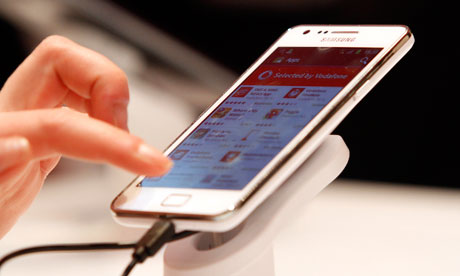
Britain's mobile phone companies open their war rooms on Monday for the long-awaited 4G spectrum auction, a process that is expected to generate a £3.5bn windfall for the Treasury and could raise a further £700m a year from existing bandwidth.
The final lineup of bidders will be confirmed on Monday, with the telecoms watchdog Ofcom issuing passwords for the electronic auction system. Teams of lawyers, accountants, economists and network technicians will assemble in sealed rooms within their headquarters, from where they will manage their bids during the two-month competition.
After a series of training sessions, the 4G bidding is expected to begin on 23 January, with activity building to about six rounds a day as participants compete for their preferred lots. Winners could be announced in early March, with 4G services arriving in May and June.
The result will be one of the biggest injections of new money into the public purse this year. In addition to the one-off payment of £3.5bn that the Treasury has budgeted to raise from the auction, the 4G prices will set a new benchmark for the annual licence fees for spectrum that mobile networks acquired in the 1980s and 1990s.
Networks pay rental costs of £65m a year. If the 4G sale raises twice the reserve price set by Ofcom, the government could collect £470m a year in rental fees, according to industry estimates based on Ofcom data. If the reserve price is trebled, the fees could rise to £700m.
Ofcom's reserve price is £1.3bn, but the government is budgeting that the auction will raise nearly three times that sum.
The prospect has prompted fierce lobbying by at least one operator. In a letter to civil servants published on the website of the Department for Media, Culture and Sport (DCMS), which oversees telecoms, Vodafone raised concerns about the "significant uncertainty" created by the forthcoming change in the way licence fees are calculated.
For Vodafone, annual licence fee payments could rise from £16m to £230m if the bidding is as competitive as it was in recent European 4G auctions such as in Ireland and the Netherlands. Seven companies have declared their intention to participate in the UK, with BT Group, the network supplier MLL Telecom and the Hong Kong telecoms conglomerate PCCW joining Vodafone, O2, Three and Everything Everywhere in the fray.
The impact of higher licences charges would be greatest on Vodafone and O2, which each own a large chunk of valuable 900MHz spectrum and a smaller slice of 1800MHz, originally awarded for 2G voice services but now available for 3G and 4G. After the 4G auction, Ofcom will calculate new fees for 900MHz and 1800MHz licences. The government has mandated Ofcom to "have particular regard to the sums bid for licences in the auction" so that the fees "reflect full market value".
Vodafone has asked for clarification from Ofcom and the DCMS, and questioned the decision to link fees to the auction outcome. The Newbury-based operator said it had concerns about its ability to forecast future costs such as the government's mobile infrastructure project, through which ministers hope to eliminate rural mobile blackspots with £150m in public funds matched by mobile networks.
The UK's smallest network, Three, has said it will not sign up to the project until after the 4G auction. Vodafone is understood to be ready to sign up, although its letter to the DCMS, written in November, suggests it too could get cold feet. It said: "As we try to forecast future operating costs (particularly in the light of additional requests, like the mobile infrastructure project), we clearly need to try and factor in other increases in operating costs of which the new annual licensing fee is potentially the biggest."

